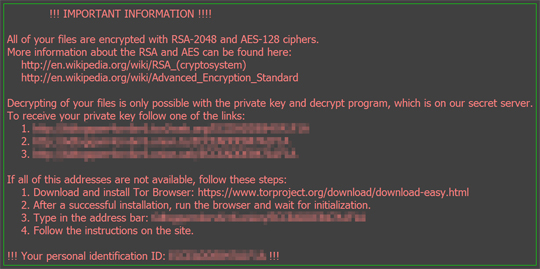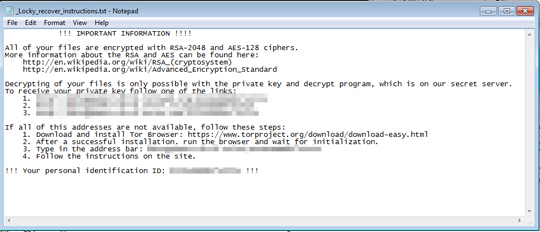RANSOM_LOCKY
Ransom:Win32/Locky!rfn (Microsoft)
Windows


Threat Type: Trojan
Destructiveness: No
Encrypted:
In the wild: Yes
OVERVIEW
This ransomware arrives via spam with macro-embedded .DOC attachment, similar to the arrival of DRIDEX malware.
It renames encrypted files to the format {unique ID per victim}{identifier}.locky.
This Trojan may be unknowingly downloaded by a user while visiting malicious websites.
It modifies the Internet Explorer Zone Settings.
It connects to certain websites to send and receive information.
TECHNICAL DETAILS
Arrival Details
This Trojan may be unknowingly downloaded by a user while visiting malicious websites.
Installation
This Trojan drops the following copies of itself into the affected system and executes them:
- %User Temp%\svchost.exe - This is deleted after encryption of files
(Note: %User Temp% is the user's temporary folder, where it usually is C:\Documents and Settings\{user name}\Local Settings\Temp on Windows 2000, Windows Server 2003, and Windows XP (32- and 64-bit); C:\Users\{user name}\AppData\Local\Temp on Windows Vista (32- and 64-bit), Windows 7 (32- and 64-bit), Windows 8 (32- and 64-bit), Windows 8.1 (32- and 64-bit), Windows Server 2008, and Windows Server 2012.)
It drops the following component file(s):
- %Desktop%\_Locky_recover_instructions.txt - ransom note
- %Desktop%\_Locky_recover_instructions.bmp - image used as wallpaper
- {Folders containing encrypted files}\_Locky_recover_instructions.txt - ransom note
(Note: %Desktop% is the desktop folder, where it usually is C:\Documents and Settings\{user name}\Desktop in Windows 2000, Windows Server 2003, and Windows XP (32- and 64-bit); C:\Users\{user name}\Desktop in Windows Vista (32- and 64-bit), Windows 7 (32- and 64-bit), Windows 8 (32- and 64-bit), Windows 8.1 (32- and 64-bit), Windows Server 2008, and Windows Server 2012.)
Autostart Technique
This Trojan adds the following registry entries to enable its automatic execution at every system startup:
HKEY_CURRENT_USER\Software\Microsoft\
Windows\CurrentVersion\Run
Locky = "%User Temp%\svchost.exe"
(Note: This registry entry is deleted after encryption of all files)
Other System Modifications
This Trojan modifies the following file(s):
- It renames the encrypted files to {unique ID per victim}{identifier}.locky
It adds the following registry keys:
HKEY_CURRENT_USER\Software\Locky
It adds the following registry entries as part of its installation routine:
HKEY_CURRENT_USER\Software\Locky
id = "{unique ID per victim}"
HKEY_CURRENT_USER\Software\Locky
pubkey = "{publick key}"
HKEY_CURRENT_USER\Software\Locky
paytext = "{ransom note}"
HKEY_CURRENT_USER\Software\Locky
completed = "1"
Web Browser Home Page and Search Page Modification
This Trojan modifies the Internet Explorer Zone Settings.
Other Details
This Trojan connects to the following website to send and receive information:
- http://{URL list depending on variant}/main.php
It encrypts files with the following extensions:
- .ARC
- .CSV
- .DOC
- .DOT
- .MYD
- .MYI
- .NEF
- .PAQ
- .PPT
- .RTF
- .SQLITE3
- .SQLITEDB
- .XLS
- .aes
- .asc
- .asf
- .asm
- .asp
- .avi
- .bak
- .bat
- .bmp
- .brd
- .bz2
- .cgm
- .class
- .cmd
- .cpp
- .crt
- .csr
- .dbf
- .dch
- .dif
- .dip
- .djv
- .djvu
- .docb
- .docm
- .docx
- .dotm
- .dotx
- .fla
- .flv
- .frm
- .gif
- .gpg
- .hwp
- .ibd
- .jar
- .java
- .jpeg
- .jpg
- .key
- .lay
- .lay6
- .ldf
- .max
- .mdb
- .mdf
- .mid
- .mkv
- .mml
- .mov
- .mpeg
- .mpg
- .ms11
- .odb
- .odg
- .odp
- .ods
- .odt
- .otg
- .otp
- .ots
- .ott
- .pas
- .pem
- .php
- .png
- .pot
- .potm
- .potx
- .ppam
- .pps
- .ppsm
- .ppsx
- .pptm
- .pptx
- .psd
- .qcow2
- .rar
- .raw
- .sch
- .sldm
- .sldx
- .slk
- .sql
- .stc
- .std
- .sti
- .stw
- .svg
- .swf
- .sxc
- .sxd
- .sxi
- .sxm
- .sxw
- .tar
- .tbk
- .tgz
- .tif
- .tiff
- .txt
- .uop
- .uot
- .vbs
- .vdi
- .vmdk
- .vmx
- .vob
- .wav
- .wks
- .wma
- .wmv
- .xlc
- .xlm
- .xlsb
- .xlsm
- .xlsx
- .xlt
- .xltm
- .xltx
- .xlw
- .xml
- .zip
- wallet.dat
It does the following:
- It prevents to encrypt files containing any of the strings in its full pathname:
- AppData
- Application Data
- Program Files
- temp
- $Recycle.Bin
- System Volume Information
- Boot
- Windows
- winnt
- thumbs.db
- After encryption of files, it uninstalls itself by deleting its autorun registry and its copy.
- It executes the following command to delete shadow copies:
vssadmin.exe Delete Shadows /All /Quiet
NOTES:
This malware sets the system's desktop wallpaper to the following image:

It opens the dropped _Locky_recover_instructions.txt, which contains the ransom note:

SOLUTION
Step 1
Before doing any scans, Windows XP, Windows Vista, and Windows 7 users must disable System Restore to allow full scanning of their computers.
Step 2
Note that not all files, folders, and registry keys and entries are installed on your computer during this malware's/spyware's/grayware's execution. This may be due to incomplete installation or other operating system conditions. If you do not find the same files/folders/registry information, please proceed to the next step.
Step 3
Restart in Safe Mode
Step 4
Delete this registry value
Important: Editing the Windows Registry incorrectly can lead to irreversible system malfunction. Please do this step only if you know how or you can ask assistance from your system administrator. Else, check this Microsoft article first before modifying your computer's registry.
- In HKEY_CURRENT_USER\Software\Microsoft\Windows\CurrentVersion\Run
- Locky = "%User Temp%\svchost.exe"
- Locky = "%User Temp%\svchost.exe"
- In HKEY_CURRENT_USER\Control Panel\Desktop
- Wallpaper = "%Desktop%\_Locky_recover_instructions.bmp"
- Wallpaper = "%Desktop%\_Locky_recover_instructions.bmp"
Step 5
Delete this registry key
Important: Editing the Windows Registry incorrectly can lead to irreversible system malfunction. Please do this step only if you know how or you can ask assistance from your system administrator. Else, check this Microsoft article first before modifying your computer's registry.
- In HKEY_CURRENT_USER\Software
- Locky
- Locky
Step 6
Search and delete these files
- %Desktop%\_Locky_recover_instructions.txt
- %Desktop%\_Locky_recover_instructions.bmp
- {Folders containing encrypted files}\_Locky_recover_instructions.txt
Step 7
Restart in normal mode and scan your computer with your Trend Micro product for files detected as RANSOM_LOCKY. If the detected files have already been cleaned, deleted, or quarantined by your Trend Micro product, no further step is required. You may opt to simply delete the quarantined files. Please check this Knowledge Base page for more information.
Step 8
Restore encrypted files from backup.
Step 9
Scan your computer with your Trend Micro product to delete files detected as RANSOM_LOCKY. If the detected files have already been cleaned, deleted, or quarantined by your Trend Micro product, no further step is required. You may opt to simply delete the quarantined files. Please check this Knowledge Base page for more information.
Did this description help? Tell us how we did.


